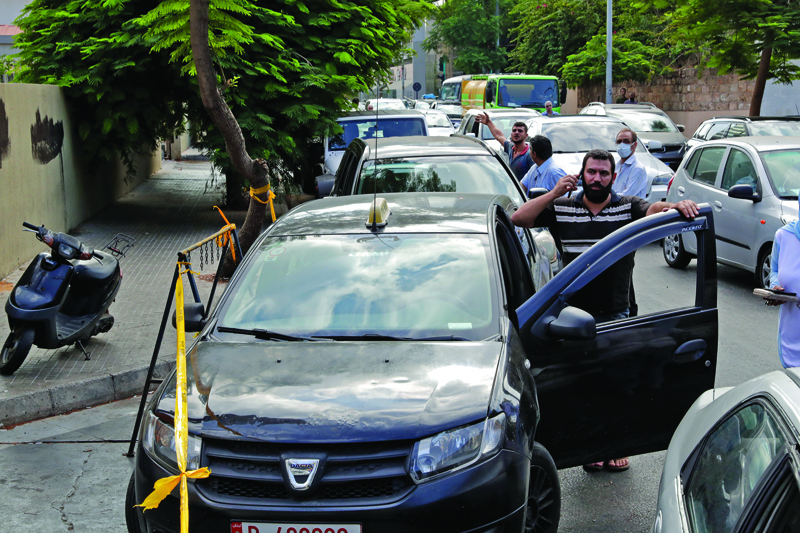 BEIRUT: Lebanese wait in a queue outside a closed petrol station in Beirut's Hamra district Friday. - AFP
BEIRUT: Lebanese wait in a queue outside a closed petrol station in Beirut's Hamra district Friday. - AFPBEIRUT: It wasn't a late-night craving that brought Ayla to a Beirut cafe but the air-conditioning that let her children, slouched in a sofa next to her, get some proper rest. Lebanon's energy crisis is dragging people to unlikely places in their desperate quest for life's essentials, be it fresh air, electricity, a working fridge or petrol for their cars.
"For two days, we have not had a single minute of power at home. The children can no longer sleep," said Ayla, a woman in her 30s. "Here, my kids can at least gain a few hours of rest in an air-conditioned space," she told AFP, her 8-year-old daughter curled up on the sofa, while her 5-year-old son slept on her lap.
Power cuts lasting more than 22 hours a day have become the new norm in a bankrupt country running out of literally everything, from fuel and gas to medicine and bread. Lebanon's inhabitants are also low on patience and courage, months into a seemingly bottomless economic free fall turning the country into a shell of its former self. "What we are going through is mind-blowing. We have nothing left, we are deprived of everything, even sleep," Ayla said.
"This is hell on earth." In a Beirut barbershop, Ahmad has given up on waiting for the light to come back on. The 20-year-old trimmed a client's beard using his cellphone torch in the simmering summer heat. "We work in very degrading conditions," he told AFP, sweat staining his T-shirt. Others have opted to move their barber chairs onto the pavement to get direct daylight.
'Humiliating'
Lebanon's economic collapse has stripped the national currency of most of its value and left four out of five inhabitants below the poverty line. The slow-motion collapse of the state switched to fast-forward this month after central bank governor Riad Salameh announced an end to subsidized fuel imports.
Widespread panic ensued, with distributors scaling down fuel supply and motorists flocking to pumps ahead of price hikes. At night, endless lines of empty cars whose drivers went home for some sleep but wanted to keep their spot in the petrol station queue clog up the lightless streets of Beirut.
Most traffic lights switched off months ago, soon followed by street lamps and shop signs, creating an eerie dystopian feel. In the morning, when drivers return to their double-parked cars to resume the wait for petrol, the mood is a mix of explosive anger and muted desperation. "My car has been parked in a queue outside the filling station for two days but I still have no petrol," taxi driver Abu Karim told AFP from a Beirut station.
"Is there anything more degrading and humiliating than this?" he asked, other empty vehicles lined for kilometers (miles) behind him. The country's leaders-widely accused corruption and negligence-live in a separate bubble, Abu Karim said. "They lack nothing, not electricity, nor fuel and live totally disconnected from this reality."
'I will starve'
In recent weeks, employees have stayed at home or slept at work for lack of transport options. Many cafes, restaurants and stores have been forced shut by electricity and fuel shortages. Those that remain open are frequented mostly by people looking to charge their devices, or catch a few hours of rest. A popular bakery chain that operates eight outlets across the country has closed three of its branches and slashed operating hours so that it can stay afloat. Having to turn to the black market to source fuel needed to keep refrigerators running overnight, operating costs have skyrocketed.
"We are forced to buy diesel on the black market at 500,000 Lebanese pounds ($333 at the official rate) for every 20 liters (around 4 gallons) to run our generator," floor manager Elie Zwein told AFP. He said this is more than five times what he used to pay last month. In a small low-key bar only a few miles away, Ahmad el-Malla also had to make adjustments. He uses a UPS battery system to power a coffee machine and small fridges storing alcohol bottles and bags of ice.
But his set-up doesn't allow him to turn on lights or even a small fan to keep his customers cool in the sweltering heat. Malla said his clients would rather drink in the dark then remain trapped at home without power or air-conditioning. "I have no choice, I cannot close," Malla told AFP. "If I don't work, I will starve." - AFP










